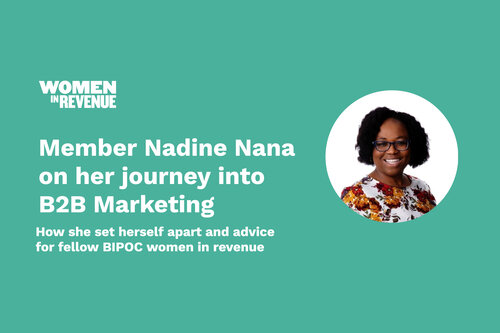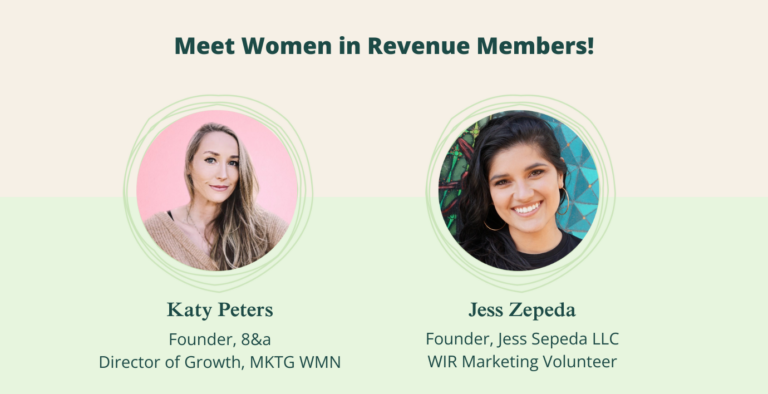By Nadine Nana, Marketing Technology Consultant
Let’s start by saying, “humble beginning” is not enough to describe the early years of my life. I was raised in the slums of Africa. My family did not have access to electricity until I was 7 years old. We were the first in my neighborhood to have a TV when I was 13 and moved out of slums when I was 16. I graduated from high school knowing what a computer was but without ever seeing one.
I was introduced to B2B marketing technology 2 years after graduating with my MS in applied economics. I was hired to manage data and analytics for a start-up company who had no database. Because of my background with data, that was a greenfield opportunity for me. Over the next 2 years, I worked tirelessly to create the company data model, integrate different data sources, and support the implementation of the marketing automation platform. I was still very shy, but building my expertise in the marketing tech stack meant I had something of value to contribute and when I spoke, people listened because I could see patterns in data no one could. I took several classes to build up my communication skills.
One of my bosses encouraged me to be more assertive and more visible, that is when I started to fully embrace my blackness unapologetically. Learning to be candid with others (not trying to sugar coat things) made me a lot of friends and some few enemies. I would setup bold quarterly goals and use data to track our progress against them. I added value to others by providing them with insights so they could make better business decisions.
I implemented marketing programs and built sustainable processes that made my employer a lot of money. I built a training program to enable other people in the company to learn how to use marketing technologies and understand marketing data. I travelled in Europe and Asia to train internal teams on MarTech and met with a lot of other minority women who were working in the mobile technology industry that were facing the same issues as I was.
I went on to develop a Demand Generation and Marketing Operations function at a SaaS company in North East. For 2.5 years, I had to battle my way through cultural biases and male chauvinism. I was the only black at the leadership level and the only female on the revenue operations and technology and infrastructure council. But if I learned anything about where I come from and some of the female role models I admire, it is to not be apologetic about who you are and to not devalue yourself to fit in with “the guys”. In that role, I learned a good deal about leadership. One can be an expert in a topic or an area but unless they learn how to influence others and use their problem-solving abilities to add value to others, that expertise will always be overlooked. This is one of the reasons it is a lot harder for engineers to be good managers or leaders. They simply focus on their area of expertise and sometimes overlook the big picture.
To be successful in B2B marketing, one must constantly be learning about market trend and new tools and systems. When I managed to align the sales and marketing team on goals and KPIs using the demand waterfall process developed by Sirius Decisions, I felt like a superwoman. I implemented some other new cool and fun marketing technologies too. It is not always fun to be in B2B marketing because the goals are measurable and just like in sales when the goals are not met, it is obvious to everyone. There is a little left to subjectivity in B2B marketing.
My experience working in B2B was the catalyst for me to start a consulting business. I help small and mostly not -for-profit companies navigate the digital landscape through ROI oriented marketing operations processes and technology support. As a marketing automation/technology consultant I design, integrate and optimize processes across technology platforms to deliver better customer experiences – at the same time making sure that the right information is being captured, and use effective campaigns to nurture prospects and consumers.
Here is some advice based on my own experience women of color need to do to survive and thrive in B2B marketing:
- Data is your best friend – a lot of us are still weighted down by stereotypes, girls are good at literature and boys are good at math, even though there are more females who are graduating in the STEM field. At some point we doubt ourselves and lose confidence in our abilities, even when we have a diploma that shows we are good at the subject.
- Know your craft and know it well, and do not be afraid to show off. Assume you always have 2 strikes against you before a meeting even starts. A woman and a minority – double whammy. Do not be afraid to ask questions, especially “Why?”
- Connect with other women, they do not necessarily need to be in the same field or at the same level as you. Building a network of people you can rely on for shared experience is critical. There are several B2B marketing networking groups with some good programs to help woman become a more effective B2B marketer.
- If you feel that your skills are lacking, take some training online. There are a lot of resources nowadays on B2B marketing from setting goals, developing, and deploying campaigns and measuring.
- Use your skills for social good or to help a not-for-profit. I find volunteering very fulfilling. It balances out the negativity of the corporate world and gives a sense purpose and boost of confidence. Also, we get a lot more from mentoring the younger generation. The new generation is bolder than we were at that age and are focusing less on being perfect than to be fully represented.
- Stay true to yourself. Know that you cannot win all the battles, but always look at the big picture.
The best part about being a B2B marketer is the constant learning opportunities. We are always trying new things, testing, adjusting, investing in what works and discarding what does not. It is a constantly evolving field.




